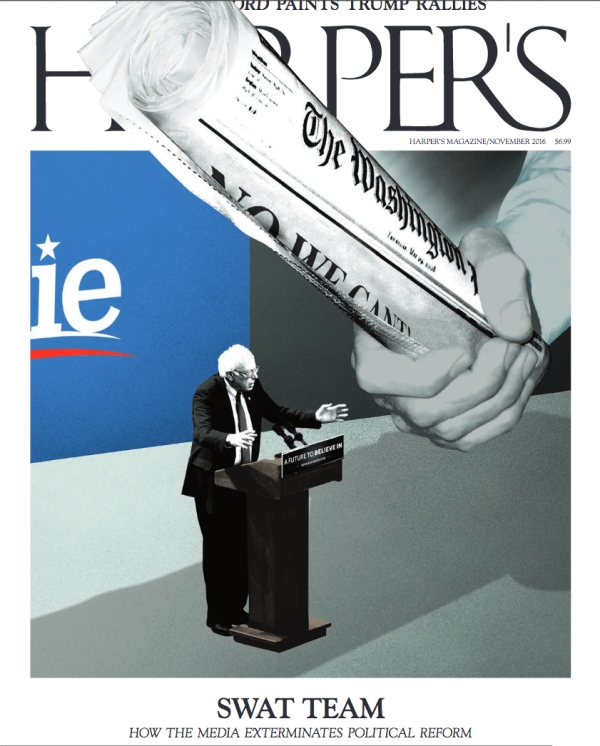HARPERS: Think of all the grand ideas that flicker in the background of the Sanders-denouncing stories I have just recounted. There is the admiration for consensus, the worship of pragmatism and bipartisanship, the contempt for populist outcry, the repeated equating of dissent with partisan disloyalty. And think of the specific policy pratfalls: the cheers for TARP, the jeers aimed at bank regulation, the dismissal of single-payer health care as a preposterous dream.This stuff is not mysterious. We can easily identify the political orientation behind it from one of the very first pages of the Roger Tory Peterson Field Guide to the Ideologies. This is common Seaboard Centrism, its markings of complacency and smugness as distinctive as ever, its habitat the familiar Beltway precincts of comfort and exclusivity. Whether you encounter it during a recession or a bull market, its call is the same: it reassures us that the experts who head up our system of government have everything well under control.
It is, of course, an ideology of the professional class, of sound-minded East Coast strivers, fresh out of Princeton or Harvard, eagerly quoting as “authorities” their peers in the other professions, whether economists at MIT or analysts at Credit Suisse or political scientists at Brookings. Above all, this is an insider’s ideology; a way of thinking that comes from a place of economic security and takes a view of the common people that is distinctly patrician. vNow, here’s the mystery. As a group, journalists aren’t economically secure. The boom years of journalistic professionalization are long over. Newspapers are museum pieces every bit as much as Bernie Sanders’s New Deal policies. The newsroom layoffs never end: in 2014 alone, 3,800 full-time editorial personnel got the axe, and the bloodletting continues, with Gannett announcing in September a plan to cut more than 200 staffers from its New Jersey papers. Book-review editors are so rare a specimen that they may disappear completely, unless somebody starts breeding them in captivity. The same thing goes for the journalists who once covered police departments and city government. At some papers, opinion columnists are expected to have day jobs elsewhere, and copy editors have largely gone the way of the great auk.
In other words, no group knows the story of the dying middle class more intimately than journalists. So why do the people at the very top of this profession identify themselves with the smug, the satisfied, the powerful? Why would a person working in a moribund industry compose a paean to the Wall Street bailouts? […] Maybe it’s something about journalism itself. This is a field, after all, that has embraced the forces that are killing it to an almost pathological degree. No institution has a greater appetite for trendy internet thinkers than journalism schools. We are all desperately convincing ourselves that we need to become entrepreneurs, or to get ourselves attuned to the digital future—the future, that is, as it is described for us hardheaded journalists by a cast of transparent bullshit artists. When the TV comedian John Oliver recently did a riff on the tragic decline of newspaper journalism, just about the only group in America that didn’t like it was—that’s right, the Newspaper Association of America, which didn’t think we should be nostalgic about the days when its members were successful. Truly, we are like buffalo nuzzling the rifles of our hunters. MORE

